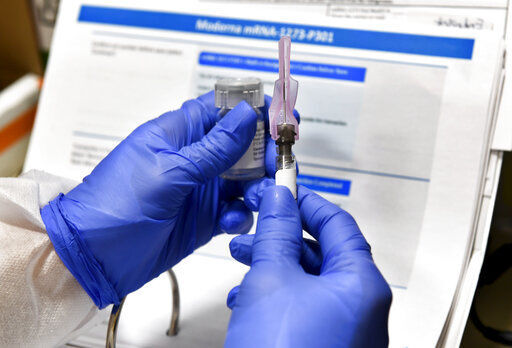Moderna Inc. said it would ask U.S. and European regulators today to allow emergency use of its COVID-19 vaccine as new study results confirm the shots offer strong protection — ramping up the race to begin limited vaccinations as the coronavirus rampage worsens.
Multiple vaccine candidates must succeed for the world to stamp out the pandemic, which has been on the upswing in the U.S. and Europe.
Moderna is just behind Pfizer and its German partner BioNTech in seeking to begin vaccinations in the U.S. in December. Across the Atlantic, British regulators also are assessing the Pfizer shot and another from AstraZeneca.
Moderna created its shots with the U.S. National Institutes of Health and already had a hint they were working, but said it got the final needed results over the weekend that suggest the vaccine is more than 94% effective.
Of 196 COVID-19 cases so far in its huge U.S. study, 185 were trial participants who received the placebo and 11 who got the real vaccine. The only people who got severely ill — 30 participants, including one who died — had received dummy shots, said Dr. Tal Zaks, the Cambridge, Mass., company’s chief medical officer.
Moderna said the shots’ effectiveness and a good safety record so far — with only temporary, flu-like side effects — mean they meet requirements set by the U.S. Food and Drug Administration for emergency use before the final-stage testing is complete.
WHAT COMES NEXTThe FDA has pledged that before it decides to roll out any COVID-19 vaccines, its scientific advisers will publicly debate whether there’s enough evidence behind each candidate.
First up on Dec. 10, Pfizer and BioNTech will present data suggesting their vaccine candidate is 95% effective. Moderna said its turn at this “science court” is expected exactly a week later, on Dec. 17.
STILL IN THE PIPELINEJohnson & Johnson also is in final-stage testing in the U.S. and several other countries to see if its vaccine candidate could work with just one dose.
Both the J&J and AstraZeneca vaccines work by using harmless cold viruses to carry the spike protein gene into the body and prime the immune system.
AstraZeneca’s testing regimen is under review after reporting confusing results.
The different technologies have ramifications for how easily different vaccines could be distributed globally. The AstraZeneca shots won’t require freezer storage like the Pfizer and Moderna vaccines.
Candidates made with still other technologies are in late-stage testing, too. Another U.S. company, Novavax Inc., announced Monday that it has finished enrolling 15,000 people in a late-stage study in Britain and plans to begin recruiting even more volunteers for final testing in the U.S. and Mexico “in the coming weeks.”
Vaccines made by three Chinese companies and a Russian candidate also are being tested in thousands of people in countries around the world.


